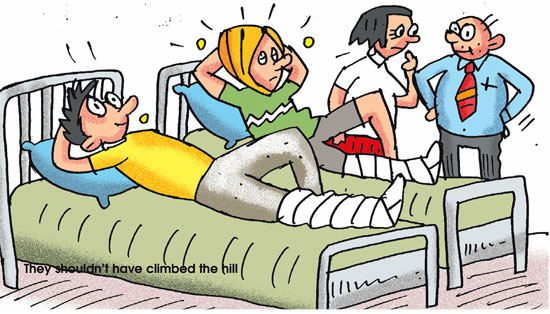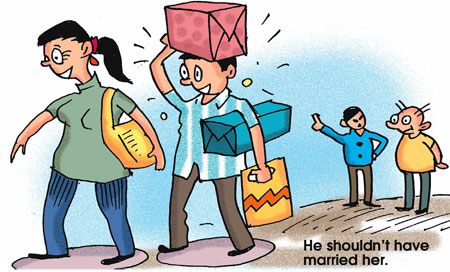|

by R. S. Karunaratne
Perfect modal verbs
If you did not do something important, you can say, “I should have
done it.”
More examples

I should have done higher studies.
We should have waited for the chief guest’s arrival.
You should have got up early.
He should have applied for the post of translator.
She should have asked for a transfer.
They should have built a bigger house.
The negative
I shouldn’t have lost my temper.
We shouldn’t have waited till the rain ceased.
You shouldn’t have criticised your friend’s conduct.
He shouldn’t have married her.
You shouldn’t have become a teacher.
They shouldn’t have climbed the hill.
If somebody didn’t do something that was possible, we can say he
could have done it.
I could have learnt driving.
We could have become rich.
You could have gone to Japan.
He could have passed the examination.
She could have drawn the picture of an elephant.
They could have painted the house.
If we say something may have happened, we mean that perhaps it happened.
I may have forgotten to lock the front door.
We may have taken the wrong bus.
You may have mistaken him for your brother.
He may have kept the door open.
She may have cut her finger with a razor.
They may have travelled to Kandy by train.
If we say that something must have happened, we mean that we feel
sure that it happened.
I answered all the questions easily and I must have passed the
examination.
The police must have arrested the wrong man.
We must have given him the wrong information.
You must have met my brother sometime ago.

He must have run away from school.
She must have forgotten to bring the dictionary.
They must have found the treasure.
[Activity]
Fill in the blanks with perfect modals. Check your answers with the
key.
1. You .................. your car. (lock)
2. Nethmi .............. here at 7.30 a,m, (be)
3. Mother ................. put more sugar into my cup of tea. (put)
4. The tourist .................. the map. (bring)
5. The candidates ..............at the examination hall at 8.30 a.m.
(arrive)
6. Kamala ............... her umbrella. (bring)
7. Ganga ............... all the apples. (eat)
8. You ................ your salary on clothes. (spend)
9. She ................. to bed so early. (go)
10. We ................. cricket with them. (play)
**********************
Key:
1. You should have locked your car.
2. Nethmi should have been here at 7.30 a.m.
3. Mother should have put more sugar into my cup of tea.
4. The tourist should have brought the map.
5. The candidates should have arrived at the examination hall at 8.30
a.m.
6. Kamala should have brought her umbrella.
7. Ganga must have eaten all the apples.
8. You shouldn’t have spent your salary on clothes.
9. She shouldn’t have gone to bed so early.
10. We shouldn’t have played cricket with them.
***************************
Match words and meanings
Here’s a novel way to enrich your vocabulary. Match the words in
Column ‘A’ with the meanings in Column ‘B.’ Check your answers with the
key. The first one has been done for you.
[Column A]
J 1. breach
.... 2. breadboard
.... 3. breadcrumbs
.... 4. breadfruit
.... 5. breadline
.... 6. breadth
.... 7. breadwinner
.... 8. breakage
.... 9. breakaway
... 10. break-dancing
... 11. breakdown
... 12. breaker
... 13. breakfast
... 14. breakneck
... 15. breakout
... 16. breakthrough
... 17. break-up
... 18. breastplate
... 19. breath
... 20. breather
... 21. breathless
... 22. breathtaking
... 23. breeder
... 24. breeze
... 25. brevity
[Column B]
A. carelessly fast and dangerous
B. a meal eaten in the morning
C. a failure to work or be successful
D. something that has been broken
E. a large round tropical fruit
F. the distance from one side to another
G. the level of income somebody has when he is extremely poor
H. using only a few words
I. very small pieces of dried bread
J. to break a law or promise
K. a wooden board used to cut bread on
L. the member of a family who earns the money that the family needs
M. the act of separating from a group
N. a form of dance with very energetic movements
O. a light and pleasant wind
P. somebody who breeds animals
Q. extremely beautiful or exciting
R. not able to breathe easily
S. a short rest
T. the air that goes into and out of your lungs
U. a piece of armour that protects the chest
V. a gradual division into smaller pieces
W. an important discovery
X. a violent escape
Y. a wave moving towards the coast
***************************
Key:
2. K 3. I 4. E 5. G 6. F 7. L 8. D 9. M 10. N 11. C 12. Y 13. B 14. A
15. X 16. W 17. V 18. U 19. T 20. S 21. R 22. Q 23. P 24. O 25. H
***************************
Starters:
‘Who’, ‘What’ or ‘Which'?
‘Who’, ‘what’ and ‘which’ are ‘WH-questions. We can use ‘what’ or
‘which’ before a noun.
[What]
What films do you see?
What books do you read?

What time is it?
What CDs did you buy?
What courses have you followed?
What songs do you like?
What country do you like to visit?
What profession are you interested in?
What food do you avoid taking?
What crime has he committed?
[Which]
Which way do you go from here?
Which finger did you break?
Which boy is the tallest in your class?
Which doctor did you see?
Which party would you prefer to join?
Which time suits you better?
Which one is bigger?
Which hotel do you go to have meals?
Which phone shall I use?
Which toilet is for ladies?
Which platform does the train go from?
Which secretary sent for the fax?
[Note]
We use ‘what’ where there is a wide choice of possible answers.
What sport are you interested in?
What books do you read during the vacation?
What newspapers do you read?
What hobbies are you interested in?
What school do you attend?
We use ‘which’ when there is a limited number of possible answers.
Which way are you going?
Which girl gave you the book?
Which pen are you looking for?
Which train are you taking?
Which cupboard needs a lock?
In certain situations we can use either ‘what’ or ‘which’ in
questions.
What / Which day are you free?
What / Which day is your morning class?
What / Which train do you take?
What / Which part of the island are you from?
What / Which platform does the train go from?
We can use ‘who’, ‘what’ or ‘which’ without a noun in questions.
[Who]
Who sent this letter?
Who is it from?
Who are you?
Who built this house?
Who came first?
Who writes standard English?
Who is honest?
Who is punctual?
Who is absent?
Who is present?
[What]
What do you think of him?
What made you to resign?
What is he doing?
What comes first?
What delays the project?
What happened?
What lies below?
What goes up first?
What can you say?
[Which]
Which is quicker, the bus or the train?
Which is true?
Which is more beautiful?
Which is suitable?
Which came first?
We can use ‘which’ with ‘one’, ‘ones’ or ‘of.’
Which one would you prefer?
Which ones would you like?
Which of these cameras are yours?
‘Who’ is always used with people.
Who goes there?
Who are you?
Who is he?
Who are they?
Who will be coming as the chief guest?
Who came first?
Who loves classical music?
Who dares, wins.
Who can do this?
Who will be the next prime minister?
***************************
Form adverbs from nouns
Words often come in families. You can expand your vocabulary by
becoming familiar with these word families. Today we give you 15 nouns
in Column ‘A.’ Write the relevant adverbs in Column ‘B’ and check your
answers with the key.
Column A Column B
1. watch ............
2. water ............
3. week ............
4. weight .............
5. west ............
6. whole .............
7. width .............
8. wildness .............
9. willingness .............
10. wonder ..............
11. world ..............
12. worry ..............
13. worth ..............
14. wrong ..............
15. year ..............
***************************
Key:
1. watchfully
2. underwater
3. weekly
4. weightlessly
5. west
6. wholly
7. widely
8. wildly
9. willingly
10. wonderfully
11. worldwide
12. worryingly
13. worthily
14. wrongly
15. yearly
*************************** |

